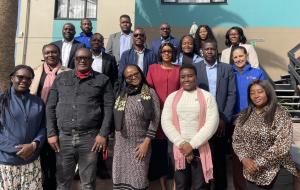Namibia Strengthens coordination of the International Health Regulations (IHR) Implementation
The Ministry of Health and Social Services (MoHSS) with technical support from WHO conducted a four-day orientation workshop of International Health Regulations (IHR) National Focal Point (NFPs) from 17 – 20 June 2025 in Swakopmund. The workshop aimed to strengthen NFPs understanding of the IHR (2005), their roles and responsibilities, and coordinating timely reporting and communication of potential public health events of international concern. Additionally, the workshop aimed to review the proposed amendments to the IHR to ensure NFP informed advise to the MoHSS leadership regarding communicating any reservations, rejections, or barriers to domestic implementation to the WHO Director-General by 19 July 2025. Overall, the meeting sought to build a comprehensive understanding of IHR requirements and strengthen national capacity for timely, coordinated, and multisectoral health reporting and response.
Ms. Iyaloo Mwaningange, Deputy Director of the Epidemiology Division in MoHSS officially welcomed participants to the workshop, emphasizing its significance in the context of ongoing public health threats and the recent proposals to revise the IHR. She further highlighted the critical role of a fully functional NFP in fulfilling Namibia’s international health obligations and protecting both public health and the economy. “Cross-sector collaboration, particularly among stakeholders in agriculture, environment, and emergency management is crucial in this context,” she said linking the workshop’s goals to national priorities and documents including the Sixth National Development Plan (NDP6), the One Health Strategy, and the Multi-Hazard Preparedness and Response Plan.
A comprehensive overview of the Integrated Disease Surveillance and Response (IDSR) strategy was presented, focusing on its aim to strengthen public health surveillance and response to priority diseases, conditions, and events across all levels of the health system from community, health facility, district, and national. The workshop also included a presentation about the Namibia’s animal health surveillance system under the Directorate of Veterinary Services (DVS), noting that public health event signals can originate from informal sources such as media reports. Animal-related events are ideally reported through the World Organization for Animal Health (WOAH) and via the National IHR Focal Point. Participants were also introduced to the WHO Event Information Site (EIS), which is a platform used by the WHO to communicate to the and provide them with important public health information as soon as possible.
Mr. Petrus Kosmas, WHO Emergency Preparedness and Risk Management officer, led the discussion on the WHO EIS and its value for IHR NFPs. He explained the role of the EIS in tracking global health events and issuing relevant announcements to State Parties. “The EIS enhances timely communication, risk assessment, and early notification of emergencies,” he said. The IHR Annexure 2 was discussed to great understanding of the step-by-step guide in assessing whether an event should be reported to WHO.
Ongoing capacity-building for the IHR NFPs remains essential to ensuring the coordination of timely event detection, verification, reporting, and response. The workshop helped to clarify roles and procedures related to both human and animal health surveillance, and emphasized the importance of integrated, multisectoral collaboration in strengthening Namibia’s compliance with IHR obligations.
The workshop concluded with key steps to improve Namibia’s IHR implementation through institutionalizing regular IHR training and simulation exercises; finalizing Namibia’s submission of the comments or reservations to the IHR amendments; strengthening intersectoral collaboration; and maximizing the use of platforms such as EIS, the NFP Knowledge Network. Participants also emphasized using Joint External Evaluation (JEE) and State Party Self-assessment Annual Reporting (SPAR) results to guide emergency preparedness and response planning.
Namibia IHR NFP consist of 16 members representing various IHR core capacity areas. The members include representatives from the Office of the Prime Minister, Ministry of Agriculture, Fisheries, Water and Land Reform, Ministry of Environment, Forestry and Tourism, and Namibia Institute of Pathology, Ministry of Health and Social Services underscoring a strong multi-sectoral commitment to national and global health security.



